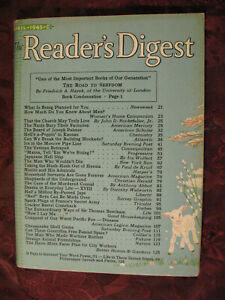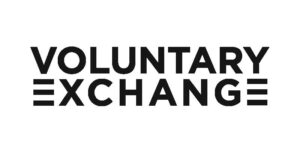 The pride of my modest economics rare book and historic document collection is the April 1945 issue of “The Reader’s Digest,” which featured a condensed version of F.A. Hayek’s Road to Serfdom. The editor’s decision 76 years ago to publish Hayek’s scholarly work for a popular audience proved to be a significant moment in economic history.
The pride of my modest economics rare book and historic document collection is the April 1945 issue of “The Reader’s Digest,” which featured a condensed version of F.A. Hayek’s Road to Serfdom. The editor’s decision 76 years ago to publish Hayek’s scholarly work for a popular audience proved to be a significant moment in economic history.
What makes the ownership of this rare publication even more special to me is the story of how I came across it. Discovered while rummaging through old magazines at a quirky Jersey Shore sandwich shop near Asbury Park, I purchased the entire 1945 set for the price of 2 Italian subs and a couple of soft drinks. My random find was as exhilarating as that of a young boy finding a Mickey Mantle rookie card in his grandfather’s attic.
Exciting new developments in the collectible market are now being generated through innovations in blockchain technology and use of non-fungible tokens (NFT’s). News reports of artists and celebrities commanding huge sums for their digital works are everywhere. Risks abound, but so do opportunities.
Deep beneath the supposed bubble of NFT CryptoPunks art and NBA Top Shot memorabilia lies a legitimate and sustainable opportunity for content creators and archivists of published works in Economics, Law, History and Political Thought.
Individuals and their affiliated institutions can use the NFT market to help expand their audience, develop new funding sources, and build longer-lasting relationships with those who support their research and ideals. Importantly, scholars, authors, film makers, and podcasters, as well as institutions such as universities, museums, and think tanks, can monetize intellectual property without giving up ownership of those assets.
For those who are not that familiar with the NFT concept, an explanation, as unsatisfying as it may be, is in order. NFT’s are certificates of authenticity for digital artifacts that are recorded (minted) on a blockchain. They are tokenized assets that do not, generally, carry intellectual property grants or licenses, but instead are valued for their uniqueness, rarity, and their historical significance.
NFT’s have been branded as a vehicle for “ascribing value to a category of cultural phenomena that people already want to pay for.” NFT exchange platforms are establishing functional digital markets for underlying tangible niche assets — in this case, historically significant scholarly and popular publications.
As is the case with tangible works of art and rare collectibles, an item’s emotional return on investment can be just as important as its monetary value. Collectors who purchase NFTs often feel a sense of patronage to the content creator. For many, their pride of ownership can help generate a personal connection to the authors. By owning, admiring, and sharing their assets, collectors become stakeholders in the advancement of a common vision.
 Originally, Voluntary Exchange was a project built to help promote the “economic way of thinking” to a mainstream audience. It served as a repository of curated articles, videos and podcasts that were thought-provoking and inspiring. This next iteration of the Voluntary Exchange project will help expand the ecosystem of liberty-minded content creators and consumers through our NFT platform.
Originally, Voluntary Exchange was a project built to help promote the “economic way of thinking” to a mainstream audience. It served as a repository of curated articles, videos and podcasts that were thought-provoking and inspiring. This next iteration of the Voluntary Exchange project will help expand the ecosystem of liberty-minded content creators and consumers through our NFT platform.
 I hope you will consider becoming a part of the Voluntary Exchange community. Please contact me to share your thoughts.
I hope you will consider becoming a part of the Voluntary Exchange community. Please contact me to share your thoughts.
Joe DiFiglia
Follow on: Linkedin, Facebook, Twitter

